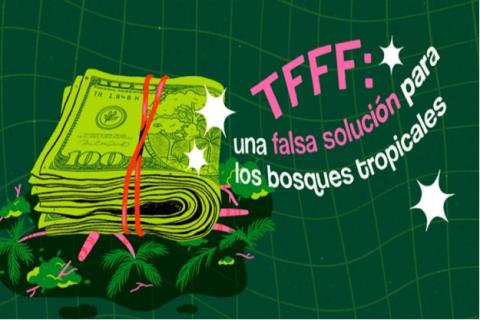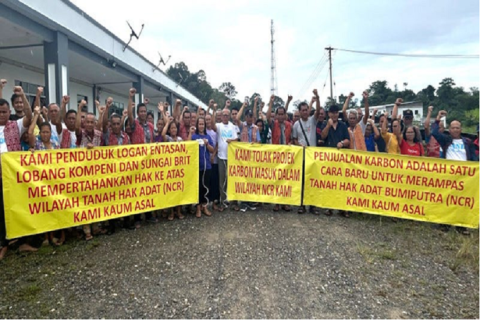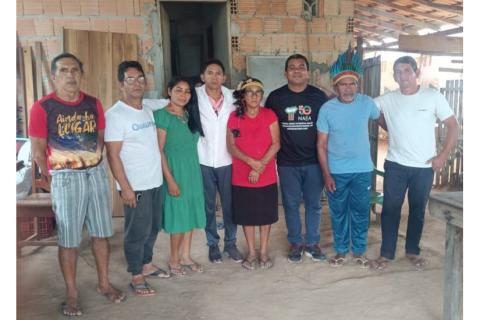The new report from GRAIN shows how IT corporations like Meta, Microsoft and Amazon are turning to carbon markets to hide their ballooning greenhouse gas emissions, caused in large part by the industry’s push for increasing use of energy-heavy AI and cloud computing. GRAIN’s research looks at how in particular Amazon and the USD 10 billion Bezos Earth Fund set up by Amazon co-founder Jeff Bezos don’t stop at just buying carbon credits. Both are involved in creating the infrastructure to produce carbon credits.
Other information
Since the Paris Agreement, tree plantations have proliferated as purported carbon sinks and generators of carbon credits. This is a lucrative business that is also used to clean up the image of large companies. A recent article by Climate Tracker reveals some of the dirty ways companies use tree plantations to ironically promote themselves as clean. The cases come from Paraguay and Colombia. In the former, Apple uses monocultures that it presents as “forests,” in which it uses agrochemicals that are banned or restricted in other countries.
The Norwegian government through its state Pension Fund, has been a key investor in REDD-type projects, including monoculture tree plantations. Norway joined back in 2000 the World Bank´s Prototype Carbon Fund (PCF) that helped the Plantar company in Brazil to expand its eucalyptus plantations to profit from selling carbon credits.
The Nyéléni Global Forum is one of the largest and most diverse gatherings of grassroots movements in the world, bringing together organizations of peasants, indigenous peoples, traditional fisherfolk, rural workers, and feminist and environmental movements, among others. Its main goal is to strengthen the global movement for food sovereignty. The third edition of the Nyéléni Global Forum was held in Kandy, Sri Lanka, from September 6-13, 2025, and it brought together almost 700 delegates from more than 100 countries.
The report, “Energy Alternatives: Surveying the Territory,” published by The Corner House, presents data and arguments that dismantle the thesis of the “green energy transition.” It also offers an extensive compilation of community experiences that propose energy alternatives based on a conception of energy that differs from the capitalist one. Access the report here (available in English and Spanish).
This article is a scathing critique of the climate policies developed in international negotiations, such as the COPs, which only serve the economic interests of whose who are accelerating destruction on the planet. In the name of such policies, 'carbon biopirates' threaten diverse indigenous communities and their territories throughout the world. “In the face of this daunting landscape, Indigenous Peoples are not only resisting, we are also proposing alternatives,” the article states.
Energy corporations are constantly profiting from activities that fuel and finance Israel's colonial regime of apartheid and genocide against the Palestinian people. That is what stands out in the toolkit recently published by a global coalition from both within and beyond the region. Focusing on two particular corporations – Eni and Dana Petroleum, which in October 2023 were awarded gas exploration licenses from Israel in Palestinian waters – the publication is helpful to understand why energy is a critical issue in the struggle for Palestinian liberation.
The All India Conference of Forest Movements was held in Nagpur, India, from 5-7 April, 2025, bringing together over 400 representatives of Adivasi - Indigenous Peoples - and forest-dwelling communities from 14 states across India to share experiences, challenges and strategies. With a powerful presence of women, participants reported the systemic violations and threats they are facing, including harassment, forced evictions to create protected areas, the commodification of forests along with the advance of extractive projects.
On the side-lines of the UN climate conference in 2023 in the United Arab Emirates, the government of Brazil introduced the “Tropical Forests Forever Facility” (TFFF). The fund, an idea initially thought up by the World Bank in 2018, is expected to be launched at the 2025 UN climate conference in the Amazon city of in Belem, in Brazil. Private sector and public investments and donations would provide the seed capital for financial managers to speculate on capital markets.
Communities in the Apouh à Ngog region of Edéa, Cameroon, continue to resist the violence of the Socapalm company (a subsidiary of SOCFIN) and heavily armed soldiers who seek to prevent the community from recovering a portion of their ancestral lands for food crops, after years of occupation by industrial oil palm plantations. International and national opinion must be vigilant and keep an eye on this situation.
Samling is a notoriously destructive Malaysian logging, plantations and construction company which has faced decades of opposition from indigenous peoples such as the Penan and the Kenyah for destroying their customary lands. In December 2023, the Samling subsidiary SaraCarbon listed a carbon project in the Malaysian state of Sarawak in the registry of the carbon standard provider Verra.
Meticulous research conducted by the New Social Cartography of the Amazon Project in conjunction with traditional communities in the upper Acará River area over the course of five years has resulted in the dossier “Indígenas Turiwara Tembé no alto rio Acará: conflitos étnicos e territoriais”. This outstanding work describes in detail the history and resistance struggles of traditional communities in this part of Pará, proving that the Turiwara Tembé belong in the territory they have demanded for many years.










